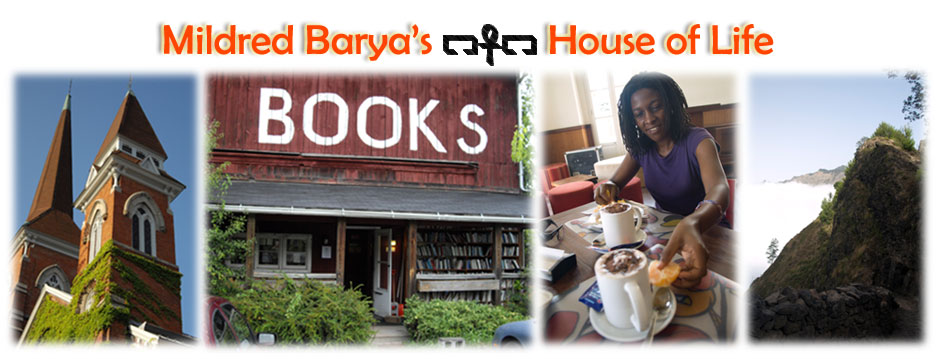Derek Walcott’s poem: “Love After Love” has been pursuing me for the last couple of months. I’m beginning to understand why. Today when I was thinking about this month’s blog post, it occurred to me that I should write about that poem and how it has stalked me in mysterious ways. I call it stalking because it finds me again and again even when I’m not looking for it.

Sign at Buffalo bookstore in Ithaca
A few months ago, while writing my dissertation, I was quoting from Deldon McNeely’s book, Mercury Rising: Women, Evil and the Trickster Gods, when all of a sudden the poem appeared on the next page–82. Considering the topic and context of McNeely’s book, I hadn’t expected Walcott’s poem. Earlier for my leisure, I had been reading David Whyte’s The Heart Aroused when turning to page 206 I found the same poem. Apparently, Walcott wrote it “as he approached his late forties, turning toward himself with the grace of a hard-won, mature acceptance,” writes Whyte. Whyte suggests that “around fifty” (midlife crisis stage or simply transition period?), “we have the possibility of taking the homeward road all the way back, through the ghostly bodies to greet ourselves at our own door, before we set out. There we may welcome all parts of ourselves to the table in celebration.” I love this sentence so much it makes me look forward to turning 50. When that time comes, if I don’t turn inward for the road home and meet my ghostly self at the door, I’ll write to Whyte and let him know I may have missed something. Anyway, the point is, five other books I randomly borrowed from the library all ended up having the Derek Walcott poem. I couldn’t help but wonder why it was after me, since I wasn’t particularly looking for it. I though it was beyond coincidence, serendipity and the like. The last time–well, maybe not the last–I was on a poetry site looking for Kamau Brathwaite’s “Bread” when suddenly “Love After Love” popped up. I said, okay, fine, what? I was about to ignore the poem but then decided that I would share it with my students instead. When I explained to my students why the poem had become intriguing, besides being a good poem anyway, they told me not to worry, they would solve the puzzle for me and give me an interpretation. So here’s the poem and I hope it finds another to haunt since I’m willing at this point to pass on the haunting.
Happy Spring.
LOVE AFTER LOVE
The time will come
when, with elation,
you will greet yourself arriving
at your own door, in your own mirror,
and each will smile at the other’s welcome,
and say, sit here. Eat.
You will love again the stranger who was your self.
Give wine. Give bread. Give back your heart
to itself, to the stranger who has loved you
all your life, whom you ignored
for another, who knows you by heart.
Take down the love letters from the bookshelf,
the photographs, the desperate notes,
peel your own image from the mirror.
Sit. Feast on your life.
Originally published in Sea Grapes, Farrar, Straus (New York, NY), 1976.






No comments yet.